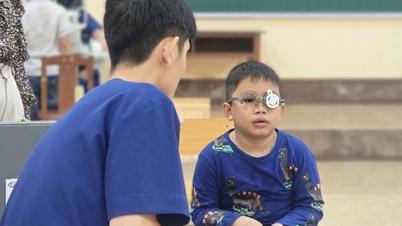My 15-year-old son has 6 degrees of nearsightedness and wants to have eye surgery. Could you please advise on the appropriate age for eye surgery and what preparations are needed before and after the operation? (Huyen, Hanoi )
Reply:
In fact, there are no specific regulations regarding the minimum degree of nearsightedness required for eye surgery. Individuals with 0.5 diopters or more, aged 18 to under 40, whose eyesight has been stable for 6-12 months, may undergo surgery, depending on their occupation or to achieve healthier, clearer vision.
Age is one of the prerequisites for a successful surgery and preventing recurrence of nearsightedness. From the age of 18 to under 40, adults have fully developed their eye size, so the eyeball does not change, affecting the degree of nearsightedness. Conversely, in people under 18, the eyes are still developing, the degree of nearsightedness is not stable and is subject to many changes.
Beyond the age of 40, along with the body's natural aging process, the lens gradually hardens, loses its elasticity, and its inherent flexibility, making it difficult for the eyes to see close objects. Furthermore, at this age, patients considering myopia surgery need to be aware of potential post-operative risks such as diabetes and glaucoma.
Myopia is considered stable if it does not increase by more than 0.75 diopters within 6 months. It is best to have a thorough examination by a doctor who will assess the stability of your vision and recommend the most appropriate treatment.
In addition, for a successful myopia surgery, the patient's corneal thickness is also checked. A cornea with a thickness of less than 500 microns is considered weak and thin, requiring care and treatment before surgery.
Things to note before and after myopia surgery.
Before undergoing refractive surgery, doctors order necessary tests to check the patient's physical condition and medical history. Pregnant or breastfeeding women are not allowed to have the surgery.
1-3 days after surgery: Wear protective eyewear to prevent dust and smoke from entering the eyes; limit exposure to light, strenuous activity, cosmetics, work, and studying.
During the first month after surgery: Avoid sports , strenuous exercise, and direct sunlight on the eyes. Within 3-6 months after surgery, patients may experience symptoms such as dry eyes and increased sensitivity to light, so careful care is needed.
Use eye drops and have regular checkups as directed by your doctor or if you notice any unusual symptoms.
Doctor Nguyen Thi Thuy Nga
Hanoi Eye Hospital 2
Source link


![[Photo] President Luong Cuong presents the Decision appointing the Deputy Chief Justice of the Supreme People's Court.](/_next/image?url=https%3A%2F%2Fvphoto.vietnam.vn%2Fthumb%2F1200x675%2Fvietnam%2Fresource%2FIMAGE%2F2026%2F01%2F07%2F1767770962259_ndo_br_1-jpg.webp&w=3840&q=75)



![[Photo] Comrade Tran Cam Tu working with the Central Party Office and other agencies on preparations for the 14th Party Congress.](/_next/image?url=https%3A%2F%2Fvphoto.vietnam.vn%2Fthumb%2F1200x675%2Fvietnam%2Fresource%2FIMAGE%2F2026%2F01%2F07%2F1767781765496_a1-bnd-7098-2032-jpg.webp&w=3840&q=75)








































































































Comment (0)